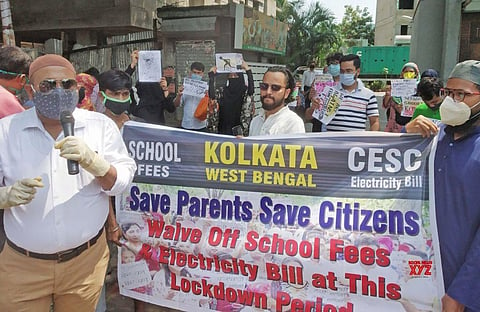

Please wear a mask and carry sanitizers -- read the poster, that called for a protest rally demanding partial school fees waiver in Kolkata.
The COVID-19 pandemic has put such protest rallies at peril. Not just because of the threat of infections spreading, but because of the added worry of flouting rules while Section 144 is in place.
But such concerns didn't stop thousands in the USA from taking to the streets to demonstrate against the murder of an unarmed Black man, identified as George Floyd, by white policemen.
In India, the new decade had kicked off with a slew of protests, where Muslim women took charge in voicing their dissent against the contentious Citizenship Act introduced by the Narendra Modi government.
The big metro cities, where individual voices often fizzle out, witnessed months-long 24-hour sit-in protests led by women. Shaheen Baghs sprang up at more than one location.
Now, six months on, to call for a protest when mass gatherings draw criminal charges, is rife with moral complications.
Rafay Siddiqui, who has been convening protests demanding waiver off partial school fees for almost a month in Kolkata, says people are helpless.
"We know the complications at hand, but if we don't take to the streets, our voices won't reach the concerned authorities. We try to maintain social distancing at our rallies and make sure everyone wears a mask while participating," he says.
Although the pandemic has hit everyone financially, most private schools in Kolkata are still insistent that parents pay the entire fee despite classes moving online.
Demonstrations by parents led to thirteen city schools run by the Church of North India (Kolkata Diocese) recently announcing a 25 per cent waiver.
"A lot of people have to start from scratch now. Classes have moved online, but private schools continue to charge full fees. When labs, library, building, transportation are not being used, why are the schools doing this? We want to pay the tuition fee because the teachers have been working hard and deserve their salary. But the rest of the fee should be waived off. And we want the state government to intervene," Siddiqui says.
Bengal since generations has been a land of protests, some powerful enough to even topple governments. The state is now administered by Chief Minister Mamata Banerjee, one of the most visceral and victorious street fighters in India. But even here, protests are being frowned upon.
"We were stopped midway by the Kolkata police and they suggested that we take the protest online, the way BJP did its virtual rally. But an online agitation won't yield any result. Among those who attended the protest, a majority are from the lower middle class. These parents still don't know how to access (the internet)," Siddiqui observes.
He is stating facts that hold good across India.
Absolute digital literacy, which can enable every citizen to raise their voice online, indeed remains a far-fetched dream. The National Sample Survey (NSS) report on Social Consumption Expenditure (2017-18) stated that only 23.8 per cent of households in our country had access to the internet.
So, even while the chances of spread of coronavirus through gatherings might loom large, these protests remain the only option.
"Jab tak raste pe nahi utrenge, tabtak koi dhyan nahi deta hai," as Siddiqui pithily states. (Till we hit the streets, no one will pay attention to us).